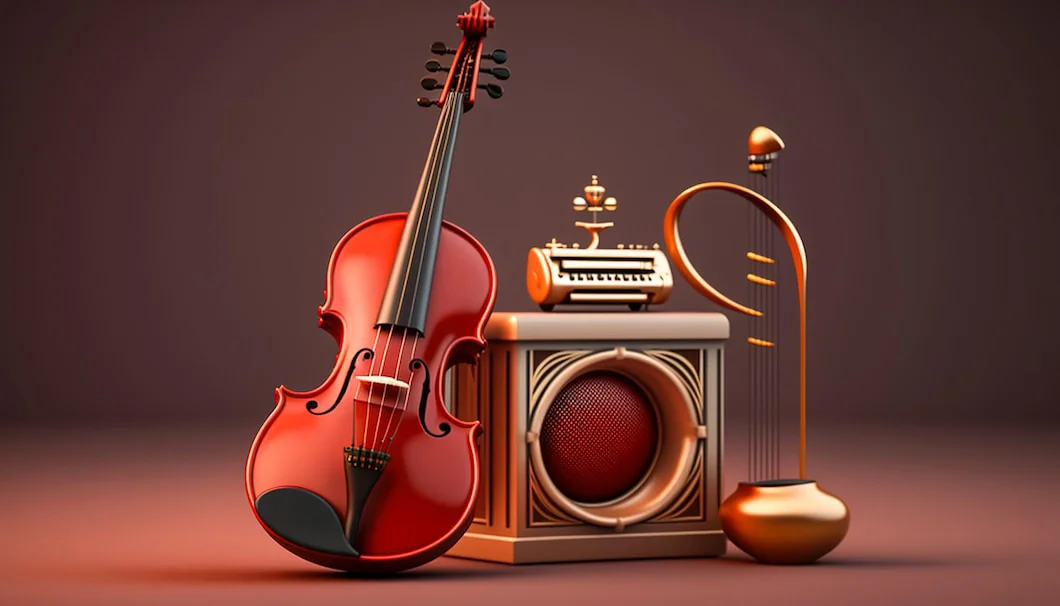Key Takeaways:
- Learning and playing instruments has a far-reaching positive impact on mental health and cognitive abilities.
- Music can improve physical health benefits, including enhanced motor skills and respiratory function.
- Music fosters community and connectivity and can even enhance professional skill sets.
- An instrument that aligns with personal preferences and lifestyle is essential for a more fulfilling experience.
Exploring the Connection Between Music and Mental Well-Being
The melodies and rhythms of music have long been known to transcend cultural barriers and soothe the soul, but recent insights reveal a substantial positive impact on mental health. Learning an instrument hands-on can result in emotional release and significant stress relief.
Indeed, according to the American Psychological Association, active participation in music can help manage stress, enhance communication, and improve emotional openness. The process involved in learning to play, especially when beginning with the easiest instrument to learn, creates a sense of accomplishment that can be deeply fulfilling.
For those facing daily pressures and anxieties, the focus required in music practice acts as a form of meditation and mental engagement, redirecting thoughts and easing tensions. By fostering a mindful approach, music becomes a hobby and a disciplined practice in cultivating inner tranquility.
Additionally, as one progresses through levels of mastery, the sense of achievement and raised self-esteem contribute profoundly to an individual’s sense of personal worth and happiness.
Childhood Development and Music Education
Music education plays a pivotal role in enriching the developmental stages of childhood. Children benefit from improved linguistic abilities, enhanced mathematical reasoning, and accelerated brain development by integrating music into early educational curricula.
Music’s coherently structural nature, with its patterns and sequences, mirrors the constructs of language and arithmetic, making it an effective cognitive development enhancer.
Socially, music education forges pathways for children to develop essential life skills. Group endeavors, such as choirs or orchestras, require active listening, empathy, and collaborative effort — skills that are instrumental beyond the music room and into every aspect of life. The framework of musical education thus instills a balanced development that nurtures both cognitive proficiencies and social competencies in children.
Fostering Creativity and Self-Expression Through Instruments
Creativity is the heartbeat of human experience, vital for personal growth and self-expression, and musical instruments serve as conduits for these explorations. Whether it’s the intimate storytelling of a guitar piece or the powerful emotion conveyed through a piano concerto, instruments facilitate a unique personal exploration. For many, the journey into music becomes a transformative process where vague emotions take shape in melodies and chords, healing and invigorating the spirit.
The ability to channel thoughts and emotions into a creative outlet such as music can be incredibly empowering. Beyond the enjoyment of playing, individuals discover their voices and often gain confidence in other areas of their lives. Stories abound from people from all walks of life who have found comfort, passion, and a sense of identity within the notes and harmonies of their chosen instruments.
The Physical Health Advantages of Playing an Instrument
Learning and playing a musical instrument presents numerous physical health benefits. Playing the piano or strumming a guitar improves fine motor skills and hand-eye coordination. Meanwhile, percussionists gain heightened rhythmic awareness and full-body coordination. An excellent example of the intersection between music and health can be witnessed in drumming workshops, often employed as therapeutic interventions to boost motor skills and cognitive function.
Beyond its impact on agility and coordination, engaging with specific instruments can lead to better physical fitness. Wind and brass players, for example, develop significant control over their breathing. This control stems from the need to produce sustained and controlled tones and helps enhance lung capacity and overall cardiovascular health. Studies have investigated the neurobiological effects of music, establishing it as a catalyst for health and cognitive wellness.
Overcoming Barriers: Accessible Instruments for Beginners
Budding musicians often encounter perceived barriers when embarking on their musical quests — concerns such as the complexity of the instrument or the costs associated with learning. Thankfully, these concerns are mitigated by technology and educational approaches that emphasize accessibility. Digital platforms now offer comprehensive tutorials, while entry-level instruments like the ukulele or digital keyboards reduce financial and learning barriers. This democratization of music learning ensures that anyone passionate about learning can start playing with minimal impediments.
Accessible instruments create a gateway for aspiring musicians, regardless of age or background, forging a path toward the myriad joys and benefits of playing. Whether through formal education, self-taught routes, or community workshops, stepping into music has become more inclusive than ever, lighting up the lives of countless enthusiasts worldwide.
Cognitive Benefits for Adults Picking Up a New Instrument
Adult learners of musical instruments stand to reap cognitive benefits that rival those experienced by younger musicians. Brain plasticity, the brain’s ability to rewire and adapt, is significantly engaged when adults commit to learning a musical instrument. This engagement improves memory retention, enhanced auditory processing, and problem-solving skills. An intriguing aspect of these cognitive enhancements is that they often extend beyond the realm of music, positively impacting the adult learner’s professional and personal life.
Such continuing education through music can be particularly invigorating for the adult brain, which now only sometimes tasks may not constantly challenge. Adults who take up musical instruments may find that the discipline required for practice helps to cultivate a structured, organized approach to other life tasks.
The Social Impact of Joining a Music Community
Embracing an instrument also means joining a more extensive, tightly-knit community of musicians. This social aspect can be as rewarding as the music, emphasizing the collective experience’s power. Such involvement can significantly enhance personal relationships, with musicians forming bonds over shared interests and goals. Moreover, participation in group settings can ease feelings of isolation and bring joy through communal creativity and performance.
Music communities, from local ensembles to online forums, are pillars of social interaction and cultural diversity. They encourage exchange and collaboration, nurturing both individual and community growth. Through such participation, musicians can broaden their horizons, absorbing varied influences that enrich their practices.
Can Music Learning Improve Your Professional Skills?
A noteworthy parallel exists between the skills developed through musical training and those utilized in the workplace. The dedication, punctuality, and focus inherently cultivated within musical practice are readily transferable to professional settings, leading to a heightened sense of commitment and management abilities. Workplaces often value the type of critical thinking that musicians exercise regularly — making on-the-fly adjustments, tuning into details, and blending harmoniously as part of a team.
For those who engage in performances, there’s an overlap with acquiring confidence in public speaking and presentations, as musicians and professionals benefit from a composed demeanor and the ability to think quickly under pressure. Such skills are a testament to the broad utility of musical education, influencing facets of life that may initially seem unrelated to music.
Choosing the Right Instrument for Your Lifestyle
Choosing an instrument to learn requires thoughtful consideration as it ideally should resonate with the learner’s personality, lifestyle, and interests. Some prefer string instruments for melodic range, while others may be drawn to percussion’s rhythm and syncopation. Factors to contemplate include:
- Physical comfort.
- The availability of teaching resources.
- The amount of time that can be dedicated to practice.
One’s aspirations in music and the desired level of challenge also play integral roles. For instance, those wishing to attain a sense of accomplishment might opt for the ‘easiest instrument to learn.’ In contrast, others seeking more profound challenges may choose complex instruments that can take decades to master. Considering such individual preferences helps ensure that the journey into music aligns with personal aspirations, paving the way for a more gratifying and long-term engagement with the art form.
Celebrating Progress: Setting Milestones in Your Musical Journey
Numerous milestones punctuate the journey of learning an instrument, and each should be celebrated. These moments of progress serve as significant morale boosters and indicators of advancement. Furthermore, recognition of progress encourages musicians to persevere and refine their skills. Whether mastering a challenging piece, developing a new technique, or simply increasing the duration of practice, these achievements should be honored. Tracking progress through recordings or performances allows musicians to appreciate their journey and maintain learning momentum. What begins as the quest to learn the most straightforward melodies often evolves into a complex tapestry of knowledge and skill. Each small achievement weaves into the next, creating an ever-growing fabric of musical capability that persists throughout a musician’s life.












